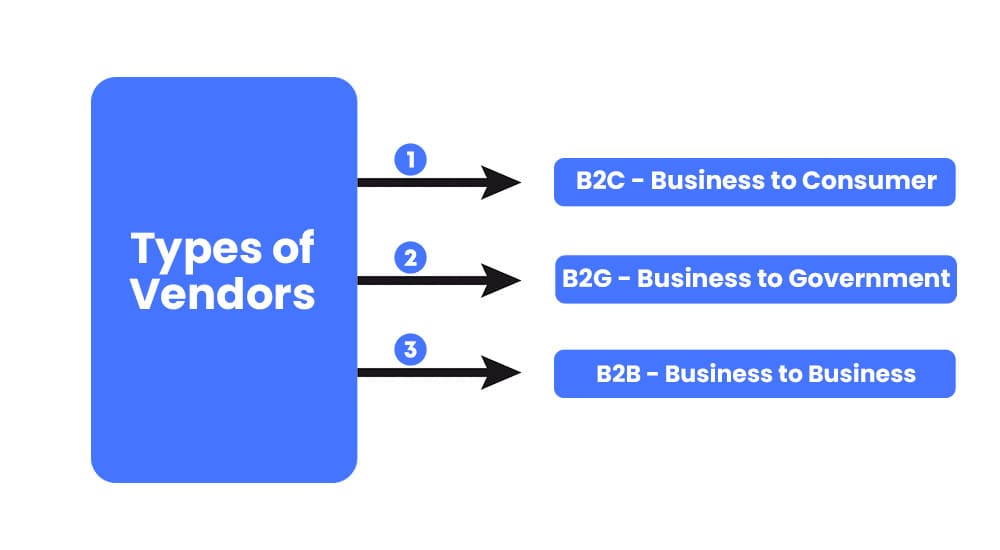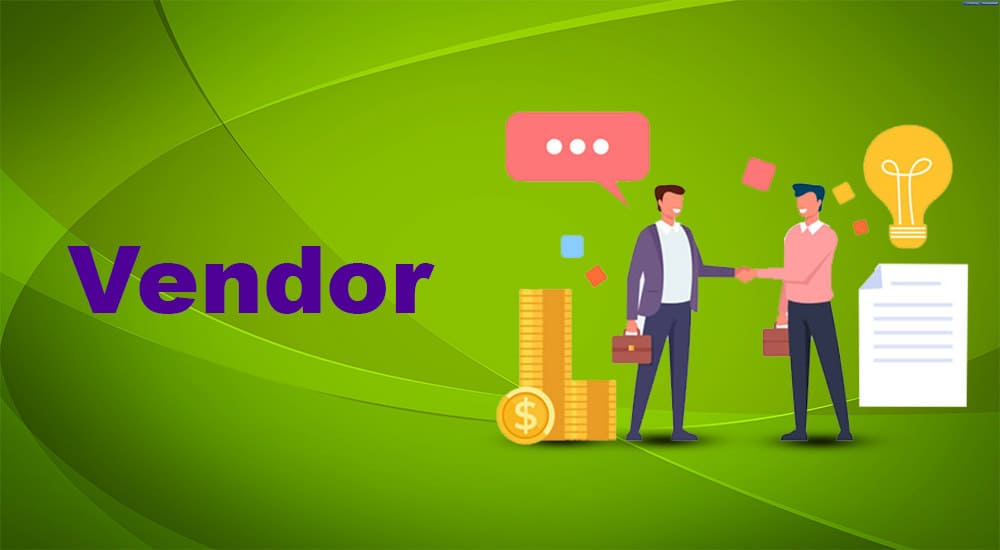Definition: A vendor is an individual or an entity that sells products and/or services to businesses or consumers in exchange for payments.
The vendor is a strategic business partner in the supply chain that provides goods and services to the business.
A bidder moves from a selected source to a supplier or vendor in a procurement cycle.
Who is a Vendor?
Vendor originated from the word vendre in French, meaning to sell. A vendor can be a supplier, contractor, service provider, etc.
Being a network of individuals, organizations, resources, activities, and technology involved in creating and selling a product, vendors can engage at different points of the supply chain. This starts with the delivery of source materials from the manufacturer to the supplier and then to the final user.
Modern businesses that optimize supply chain and procurement management consider vendor management an integral part of their business. Some businesses have implemented internal units known as vendor management offices (VMOs) dedicated to evaluating third-party providers of goods and services, supervising day-to-day interactions, and managing longer-term relationships.
Working of Vendors
Generally, vendors are middlemen who get products or goods from manufacturers and sell to the buyer and earn a profit. A vendor can be an agent to single or multiple manufacturers or businesses in a geographic location.
Types of Vendors

Vendors can be categorized into the following:
- B2C (Business to Consumer)
- B2G (Business to Government)
- B2B (Business to Business)
B2C (Business to Consumer)
The B2C type of vendor sells directly to the consumer or end user. It can sell through a retail store, such as TM Lewis, which sells formal clothing, or Apple, which sells premium smartphones, acting as a consumer vendor. A vendor can be an online retailer or someone selling hot dogs at a ballpark.
B2G (Business to Government)
The B2G type of vendor sells to the government. For example, many vendors sell different equipment to the government in the defense industry. These include Raytheon and Lockheed Martin, which sell defense products and components to the US Army. Another type of B2G vendor can be a government consultant.
B2B (Business to Business)
A B2B vendor sells to other vendors. An example of a B2B vendor is Panasonic, which sells batteries to Tesla. Other examples are microchip manufacturers such as Intel or Advanced Micro Devices, which sell components to personal computer manufacturers.
The items sold are stored in inventory either for a short or long period for use in producing other goods or services.
Vendor Management
Vendor management is developing good working relationships with vendors. It helps organizations to control costs, reduce risks, ensure excellent service, and derive value from vendors over time.
The vendor management process includes segmentation, collaboration, implementation, and evaluation.
#1. Segmentation: During this stage, the business classifies and selects vendors depending on technical factors like capability, product quality, experience, risk, performance, and volume of transactions. This helps procurement managers determine the necessary vendor relationship.
#2. Collaboration: This is an essential part of vendor management, where negotiation takes place to build value for the business. It is essential to promote mutual understanding while negotiating. Working with vendors will help the business reduce costs and risks while driving innovation and value.
#3. Implementation: Businesses must execute vendor management plans efficiently, focusing on a vendor’s strengths to increase the business value.
The plan is expected to be implemented effectively to achieve corporate goals and objectives. This will result in more vendors’ participation since they want to work with an organization with an efficient vendor management process.
#4. Evaluation: In this last stage of the vendor management process, the procurement manager reviews and measures vendors’ performance to confirm whether the selected vendor is delivering the expected value according to the contract terms and conditions.
Buyers and vendors can meet to discuss action plans for improvement as the business relationship evolves.
Benefits of Vendor Management
The benefits of vendor management are as follows:
#1. Risk Mitigation: Risks can be mitigated when vendors are managed effectively using a centralized vendor management solution. Vendor management can help track suppliers and offer data about vendor risks to help businesses reduce risk or choose a different vendor.
Vendor management makes it easy to track performance, verify vendor certifications and qualifications, and get an idea of a vendor’s financial status to protect the business.
#2. Performance Enhancement: Keeping an up-to-date log of suppliers’ performance allows management to track vendor performance and compare it to the performance indicated in the contract.
This ensures that the supplier meets business requirements.
#3. Better Rate Negotiation: Effective vendor management builds good relationships with vendors, which improves the ability to negotiate rates and provides businesses access to certain discounts.
Vendor management also increases visibility, making the business see unnecessary items costing money.
#4. Improved Loyalty: Building relationships with business vendors and managing vendor processes effectively allows loyalty to be built between the company and its suppliers. Commitment will reduce vendor turnover and help keep great vendors around for an extended time.
#5. Brand Enhancement: A corporate brand is an essential part of every business, and each vendor should add to this brand. Management wants to ensure that vendors are ethical and professional so that they can further protect their brand.
Vendor management programs help businesses to evaluate a vendor’s ethics, including their environmental and social ethics.
Conclusion
Vendors are critical stakeholders in a business process. They fill gaps in technology, expertise, and materials to enable businesses to meet their goals. Every business needs a vendor in one form or another as the business expands and gains more market share. Vendors also need to be effectively managed to reduce supply chain risk or disruption and ensure quality goods and services are delivered at the right time.

I need vendor